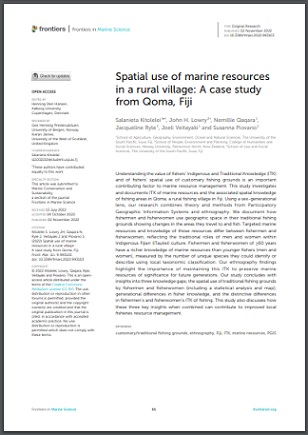
Understanding the value of fishers’ Indigenous and Traditional Knowledge (ITK) and of fishers’ spatial use of customary fishing grounds is an important contributing factor to marine resource management. This study investigates and documents ITK of marine resources and the associated spatial knowledge of fishing areas in Qoma, a rural fishing village in Fiji. Using a sex-generational lens, our research combines theory and methods from Participatory Geographic Information Systems and ethnography. We document how fishermen and fisherwomen use geographic space in their traditional fishing grounds showing changes in the areas they travel to and fish. Targeted marine resources and knowledge of those resources differ between fishermen and fisherwomen, reflecting the traditional roles of men and women within Indigenous Fijian (iTaukei) culture. Fishermen and fisherwomen of ≥60 years have a richer knowledge of marine resources than younger fishers (men and women), measured by the number of unique species they could identify or describe using local taxonomic classification. Our ethnography findings highlight the importance of maintaining this ITK to preserve marine resources of significance for future generations. Our study concludes with insights into three knowledge gaps; the spatial use of traditional fishing grounds by fishermen and fisherwomen (including a statistical analysis and map), generational differences in fisher knowledge, and the distinctive differences in fishermen’s and fisherwomen’s ITK of fishing. This study also discusses how these three key insights when combined can contribute to improved local fisheries resource management.














